Several one-handed puzzle games offer accessibility for disabled players. You’ll find options like Zachtronics Solitaire Collection, Slay the Spire, and point-and-click adventures that require only mouse controls. These games boost cognitive skills while reducing anxiety through engaging challenges. The Xbox Adaptive Controller enhances accessibility with customizable settings, while games with adjustable speeds accommodate different abilities. Discover how these thoughtfully designed games can improve your focus, problem-solving skills, and overall well-being.
Popular One-Handed Puzzle Games for Various Disabilities
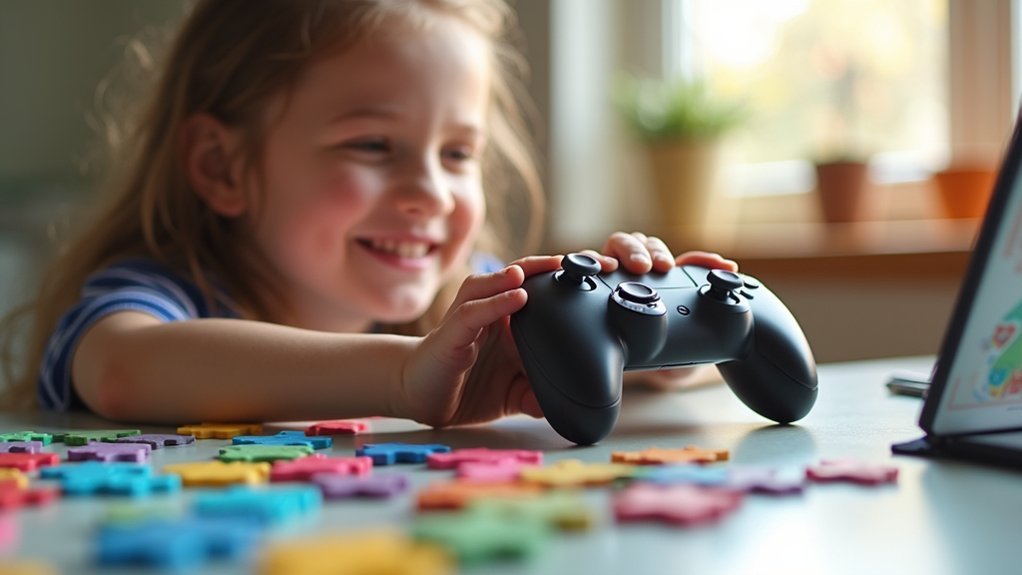
Many puzzle enthusiasts with physical limitations can still enjoy gaming through one-handed accessible options.
Games like Clash Memory Game and Eventide: Slavic Fable offer mouse-only controls perfect for players with limited dexterity.
Mouse-only puzzle games open worlds of adventure for players with dexterity challenges through thoughtful, accessible design.
Point-and-click adventures such as Return to Monkey Island and Thimbleweed Park provide engaging storytelling without complex control schemes.
Card games like Slay the Spire deliver strategic depth while remaining accessible with simple mouse interactions.
For Nintendo Switch users, Animal Crossing: New Horizons allows control remapping for comfortable one-handed play.
Several highly-rated puzzlers can be played using only Dpad or arrows, making them excellent options for players with limited mobility.
Turn-based strategy games like Stellaris give you plenty of time to make decisions without pressure.
Visual novels and digital board games round out your options, requiring minimal inputs while delivering rich gaming experiences.
These titles prove that puzzle gaming can be both challenging and accessible.
Cognitive Benefits of Puzzle Gaming for Disabled Players
Puzzle games offer you powerful mental exercise benefits through boosting your attention, problem-solving skills, and working memory capabilities.
You’ll find these games actively reduce anxiety by providing positive stress that enhances cognitive function rather than triggering fight-or-flight responses. Regular puzzle gaming creates a calming effect similar to meditation, helping to achieve peace and tranquility while accommodating physical limitations.
Your regular engagement with puzzle games can build cognitive reserve, potentially protecting against cognitive decline while offering accessible entertainment that accommodates various physical limitations.
Mental Exercise Benefits
While physical limitations may restrict movement, one-handed puzzle games offer disabled players a powerful workout for the mind. They actively engage multiple brain regions, promoting neural plasticity and forming new connections through regular play.
You’ll experience enhanced memory as you recall shapes, colors, and piece placements during gameplay. Your attention span improves as you maintain focus on tasks without distraction, while selective attention strengthens as you filter irrelevant information.
These games also develop your problem-solving abilities by engaging executive functions like planning and decision-making. Your cognitive processing speed increases through quick decision-making under controlled conditions. Studies show that engaging with puzzles can actually delay dementia symptoms while improving overall cognitive function.
Perhaps most importantly, consistent puzzle gameplay contributes to maintaining overall brain function and may delay cognitive decline, offering both immediate benefits and long-term protection for your mental health.
Anxiety Reduction Effects
Beyond the cognitive workout, one-handed puzzle games offer significant anxiety-reduction benefits that can transform your daily experience.
These games create a peaceful environment where you’re fully engaged in problem-solving, naturally distracting your mind from stress and worries.
When you’re focused on completing a puzzle, your brain shifts attention away from anxiety triggers toward achievement. This therapeutic outlet helps you manage emotions constructively while improving your mood with each success. Research shows these activities serve as protective factors against cognitive decline while simultaneously reducing anxiety.
Many puzzle games adapt their difficulty levels, ensuring you’re challenged but not overwhelmed—a key factor in effective anxiety management.
The calm, structured nature of puzzle gameplay enhances your cognitive coping mechanisms and builds emotional resilience over time.
You’ll discover these games don’t just pass time—they actively contribute to your mental wellbeing through mindful engagement.
Adaptive Control Systems for Single-Handed Play
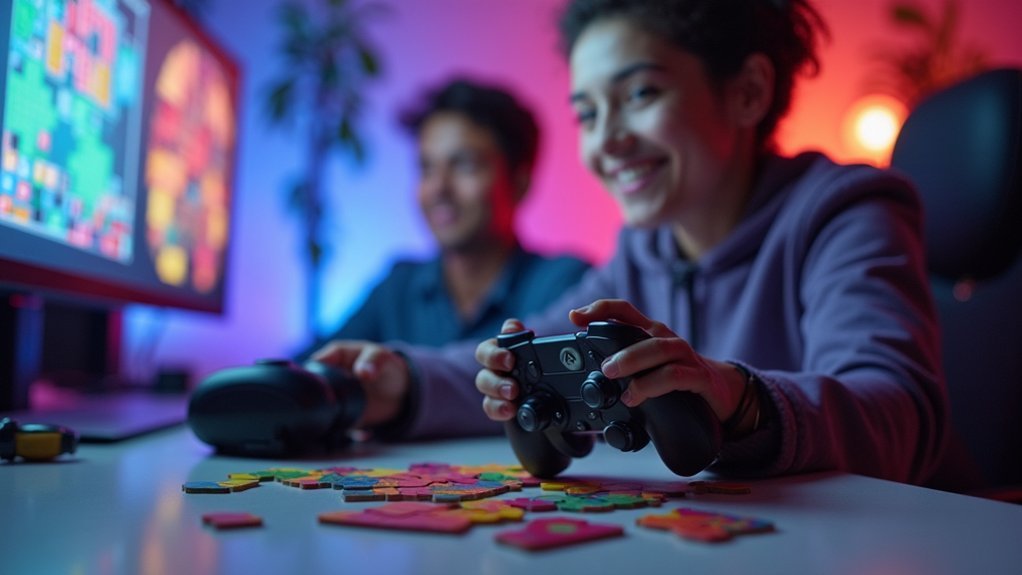
For players with limited mobility in one hand, adaptive control systems have revolutionized puzzle gaming accessibility. The Xbox Adaptive Controller stands out with its extensive customization options, allowing you to connect various switches and buttons through 3.5mm jacks and USB ports to create your ideal setup.
When configuring for one-handed play, focus on thoughtful switch placement rather than quantity. You can create multiple profiles through the Xbox Accessories app, tailoring configurations to different puzzle games. Many players benefit from using Velcro and mounting arms to stabilize their setup for comfortable long-term play.
Options like the Azeron controller with its multiple keys and built-in thumbstick or Evil Controllers’ customized one-handed solutions provide alternatives worth exploring.
Button remapping capabilities let you adapt standard controllers, though trigger buttons can only be swapped. These technologies make puzzle games more accessible while reducing the complexity of traditional two-handed control schemes.
Assistive Technologies That Enhance Puzzle Game Accessibility
Assistive technologies have dramatically expanded the world of puzzle gaming for players with physical limitations, moving far beyond standard control adaptations.
Screen readers describe game elements for visually impaired players, while magnification and contrast adjustment features make puzzles more visible. Many games now include colorblind modes to guarantee puzzles remain solvable regardless of color perception abilities. Digital magnification tools enable players to focus on specific puzzle areas without disrupting the original grid format of word searches and similar games.
Voice recognition allows you to play hands-free, with customizable commands that integrate seamlessly with gaming platforms.
For those with limited mobility, eye-tracking technology offers an innovative alternative, letting you control games through eye movements alone. These technologies often work together, creating thorough accessibility solutions.
The growing community of developers committed to accessibility continues to improve these tools, with resources like Game Accessibility Guidelines providing practical direction for inclusive design.
Game Design Features That Support Players With Limited Mobility
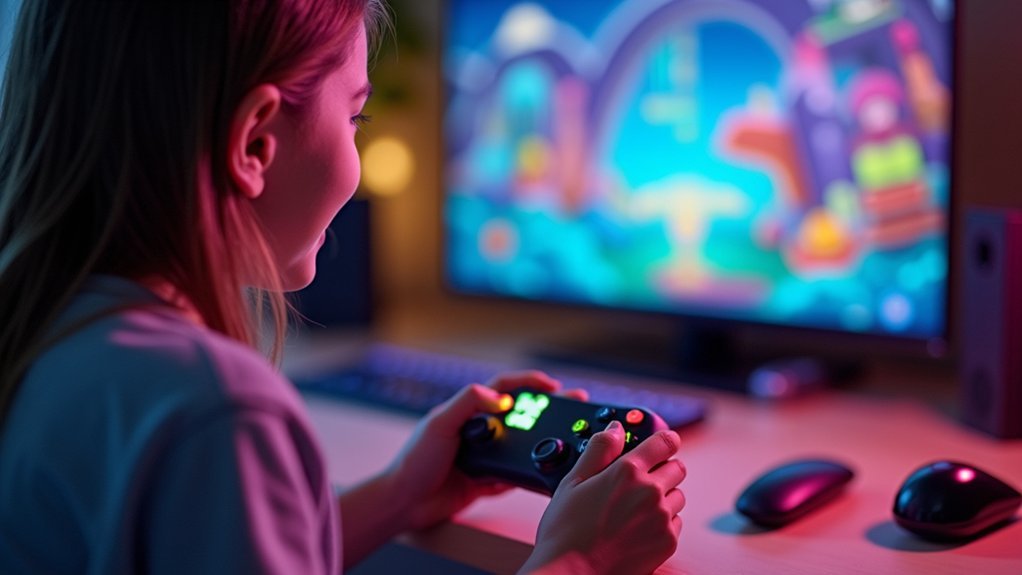
Well-designed puzzle games incorporate specific features that make one-handed play not just possible but enjoyable.
Customizable controls allow you to remap buttons to suit your specific needs, while mouse-only options on PC games provide an alternative when keyboard access is challenging.
Remapping options and mouse-only play create pathways to gaming when traditional control schemes present obstacles.
Auto-activation features reduce the need for multiple simultaneous button presses, making gameplay smoother with limited mobility.
Games with adjustable speed settings let you process information at your own pace, while assistant functions can handle repetitive tasks that might otherwise be barriers.
Clear visual feedback helps you understand how the game responds to your actions, and robust accessibility settings allow you to tailor the experience to your specific requirements.
Look for games with inclusive design principles that consider the needs of all players.
Puzzle enthusiasts should explore the Zachtronics Solitaire Collection which has been praised by the community for its one-handed accessibility.
Success Stories: How Puzzle Games Improve Quality of Life
Beyond their entertainment value, puzzle games have transformed countless lives of disabled players by offering therapeutic benefits that extend far beyond the screen.
You’ll experience cognitive improvements including enhanced memory, problem-solving skills, and even delayed onset of dementia by up to two and a half years.
These games provide emotional well-being advantages too, reducing stress, anxiety, and depression while boosting confidence through achievement.
For players with limited mobility, accessible puzzle games create inclusive spaces where everyone can participate equally.
The benefits extend to education and social development as well.
You’ll improve spatial awareness and learning abilities while connecting with others through multiplayer options.
These collaborative experiences enhance communication skills and emotional intelligence, creating meaningful social bonds within gaming communities.
The development of accessible gaming options like puzzle games has been championed by leaders such as Katy Jo Wright, who contributed to initiatives like the Xbox Adaptive Controller while managing her own disability.
Frequently Asked Questions
How Do Puzzle Games Affect Pain Management for Disabled Players?
Puzzle games help you manage pain by distracting your mind, promoting relaxation, improving your emotional well-being, and developing cognitive coping mechanisms. They’re effective complementary tools alongside traditional pain management therapies.
Can One-Handed Puzzle Games Help With Rehabilitation After Injury?
Yes, one-handed puzzle games can considerably help your rehabilitation journey. They’ll improve your cognitive functions, enhance fine motor skills, and boost your motivation through engaging gameplay that makes therapeutic exercises feel rewarding rather than tedious.
Are These Games Affordable Compared to Specialized Therapeutic Devices?
Yes, one-handed puzzle games are much more affordable than specialized therapeutic devices. You’ll typically spend $0-10 for games versus hundreds or thousands for specialized equipment, while still gaining rehabilitation benefits.
Which Puzzle Games Promote Social Interaction Among Disabled Communities?
You’ll find cooperative games like “Accessibility Quest” and multiplayer puzzle apps with voice chat extremely beneficial. Virtual game nights featuring switch-compatible brain teasers and inclusive platforms like “Together Puzzles” also foster valuable social connections.
How Do Developers Consult Disabled Players During Game Design?
Developers consult disabled players through early design inclusion, expert partnerships, targeted playtesting, and integrating assistive technologies. You’ll find they collect your feedback during concept phases and establish advisory panels for continuous consultation throughout development.
In Summary
You’ve seen how one-handed puzzle games offer more than entertainment for disabled players—they provide cognitive stimulation, independence, and community. Whether you’re using touchscreen games, adaptive controllers, or voice commands, these accessible experiences can greatly improve your quality of life. As developers continue prioritizing inclusive design, you’ll find even more options that accommodate your specific needs, making gaming a meaningful part of your journey.

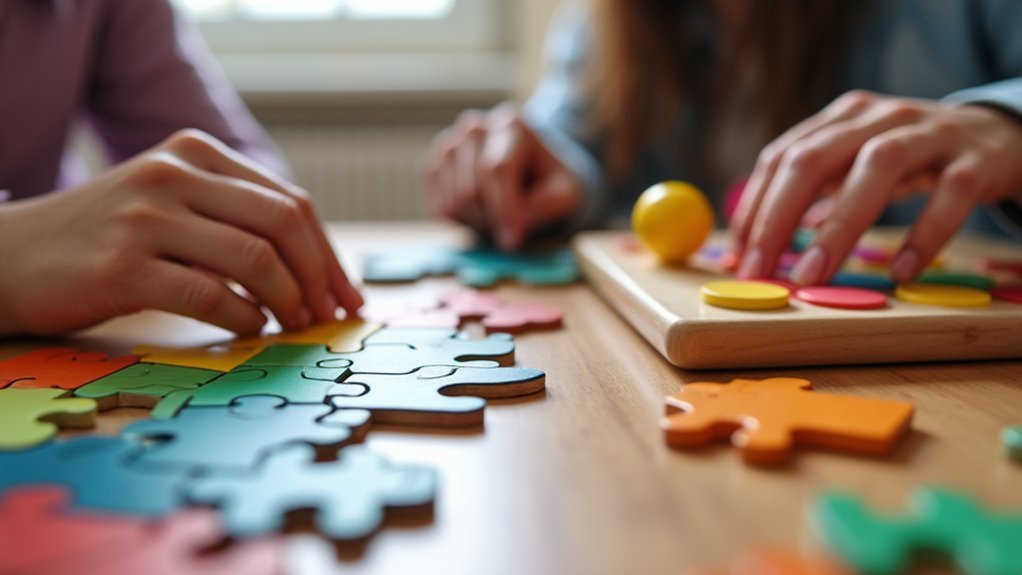

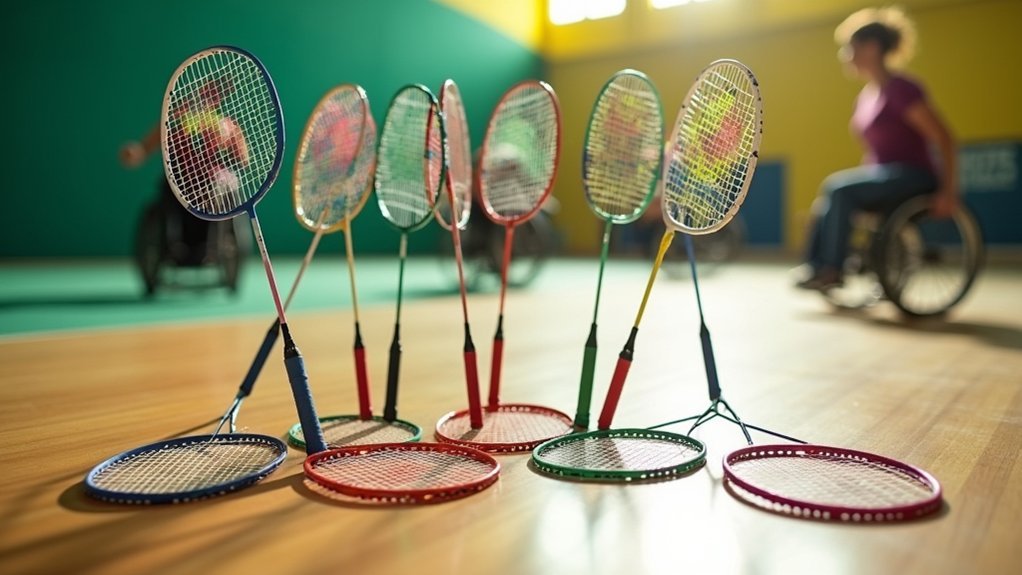

Leave a Reply